London attack: Police 'know identities of killers'
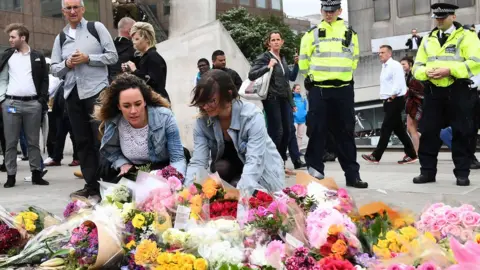 Getty Images
Getty ImagesPolice investigating Saturday night's terror attack in London say they know the identity of the three attackers who killed seven people and injured 48.
The Met Police said their names would be released "as soon as operationally possible" as officers work to establish if they were part of a wider network.
PM Theresa May said victims included a "number of nationalities", saying it was "an attack on the free world".
It comes as police have searched more addresses in east London.
Police said a "number of people" had been detained following the raids, in Newham and Barking.
Eleven people are being held after police raids in Barking on Sunday. One of the properties is believed to be the home of one of the attackers.
The three attackers were shot dead by police after driving into pedestrians on London Bridge and stabbing people in Borough Market.
The Independent Police Complaints Commission said 46 shots were fired by eight police officers - three from the City of London force and five from the Met.
NHS England said 36 people remained in hospital, with 18 in a critical condition.
Bank card on body
Canadian national Chrissy Archibald, 30, was the first victim to be named.
Her family said she had worked in a homeless shelter until she moved to Europe to be with her fiancé.
The sister of 32-year-old James McMullan, from Hackney, east London, said he was also believed to be among those who died after his bank card was found on a body at the scene.
A French national was also killed in the attack, according to foreign minister Jean-Yves Le Drian.
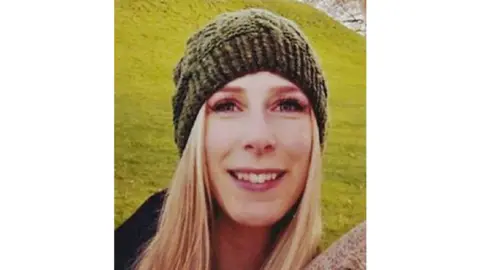 Reuters
ReutersSecurity sources in Dublin have said one of the attackers was carrying an identification card issued in the Republic of Ireland when he was shot dead, the Press Association has reported.
Meanwhile, Met Police Commissioner Cressida Dick said a "huge amount" of forensic material and evidence had been seized from the van - as well as from the police raids.
She told BBC Breakfast the investigation was moving very quickly and the priority now was to establish if anybody else was involved in the plot.
The so-called Islamic State group has claimed responsibility for the attack.
A message from Muslim faith leaders was read outside New Scotland Yard by Met Commander Mak Chishty urging the community to "root out the scourge of terrorism which hides amongst their own people and masquerades as Islam".
Two people have claimed they had warned the police about the behaviour of one of the attackers.
Speaking to the BBC's Asian Network, an unnamed man said one of the attackers had become more extreme over the past two years.
"We spoke about a particular attack that happened and, like most radicals, he had a justification for anything - everything and anything.
"And that day I realised that I need to contact the authorities," he said.
He said no action was taken.
"I did my bit... but the authorities didn't do their bit".
London Bridge rail and Tube stations both reopened early on Monday morning. The bridge and surrounding roads have also reopened.

At the scene
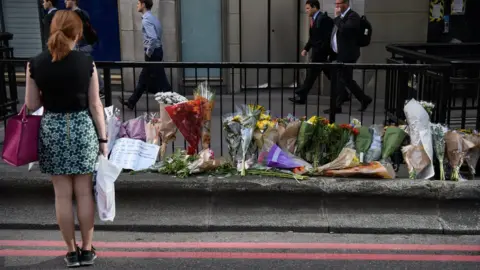 Getty Images
Getty ImagesBy BBC's Katie Wright
While the usual hordes of commuters stream across London Bridge, the large police presence and multitude of global TV crews show it's not a typical Monday morning.
James Hartley, an HR manager in the city, crosses London Bridge every morning and would "normally be marching across". Today, he took a moment to stop and reflect.
"I'm just taking in the city and thinking about what happened over the weekend. It feels really emotional."
The overriding message to Londoners has been to carry on as normal, but for some of those who work near where the attack happened, that wasn't possible logistically.
Abigail Barclay and her colleagues were gathered on the street near Borough Market unable to get into their office.
She said: "We're just working out our plan at the moment. There are lots of people out here trying to figure out what they're going to do."

Speaking on Sunday, Metropolitan Police Assistant Commissioner Mark Rowley said four police officers were among those injured, two of them seriously.
The Met said one officer received stitches to a head injury and another received injuries to his arm.
An off-duty officer, who was one of the first on the scene, remains in a serious condition.
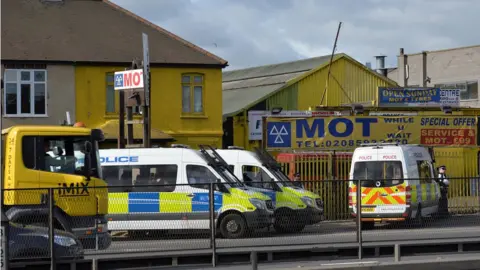
Australian Prime Minister Malcolm Turnbull has confirmed four of the country's nationals had been caught up in the attack.
Two, Candice Hedge from Brisbane and Andrew Morrison from Darwin, are among the injured after both were stabbed.
Seven French nationals were injured in the attack, including four with serious injuries, while one French national is still missing.
Among other developments:
- Prime Minister Theresa May chaired a meeting of the government's emergency committee Cobra
- A vigil is being held at 18:00 BST at Potters Field Park near London Bridge to remember the victims
- There will also be a minute's silence on Tuesday at 11:00 BST in memory of those who lost their lives and all those affected by the attacks
- Barriers have been installed on Westminster, Lambeth and Waterloo bridges following the attack to stop vehicles from mounting the pavement
- The Metropolitan Police has set up a casualty bureau on 0800 096 1233 and 020 7158 0197 for people concerned about friends or relatives
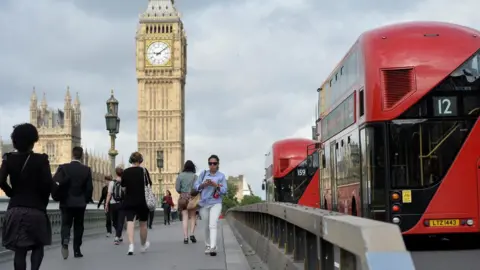 Reuters
ReutersPolice say the attack began at 21:58 BST on Saturday, when a white Renault van hired by one of the attackers drove onto London Bridge from the north side.
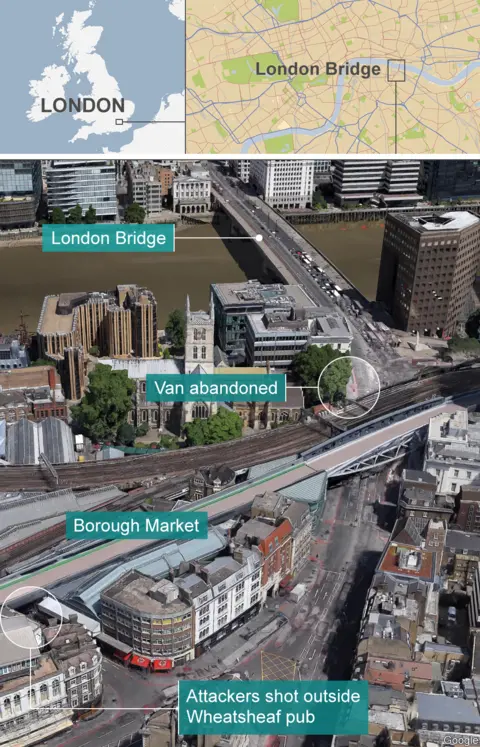
Eyewitnesses described it travelling at high speed, hitting pedestrians, before crashing close to the Barrowboy and Banker pub.
It is the third terror attack in the UK in three months, following the car and knife attack on Westminster Bridge in March, in which five people were killed, and the Manchester bombing less than two weeks ago, in which 22 people were killed.

A new normal?
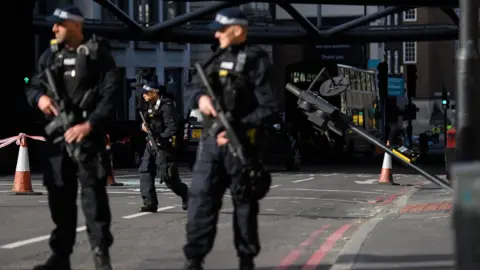 Getty Images
Getty ImagesDominic Casciani, BBC home affairs correspondent
With three attacks in three months, acts of terror against soft targets is beginning to feel, to some people, like the new normal.
The brutal reality is that this kind of threat is absolutely typical of what jihadists sought to achieve in all their attacks across Europe.
Since 2013 security services in the UK have foiled 18 plots. A large proportion of those have involved suspects who set out to commit acts of violence similar to the attacks on Westminster Bridge and London Bridge.
Plans to use bombs, such as at Manchester Arena, are rarer because plotters need to have the technical skills for such an appalling attack - but attacking people with cars and knives is far easier and has long been encouraged by so-called Islamic State and other jihadists.
The aim of the three attackers last night is abundantly clear - not only did they want to kill, but they wanted to lose their own lives.
They would have known full well that attacking people in the street would draw armed police in their direction and the fake bomb belts they were wearing would, in their own warped minds, hasten their demise.

Were you in the area? Did you witness the attack or the arrests? Share your experiences by emailing haveyoursay@bbc.co.uk.
Please include a contact number if you are willing to speak to a BBC journalist. You can also contact us in the following ways:
- WhatsApp: +44 7555 173285
- Send pictures/video to yourpics@bbc.co.uk
- Upload your pictures / video here
- Tweet: @BBC_HaveYourSay
- Text an SMS or MMS to 61124 (UK) or +44 7624 800 100 (international)
